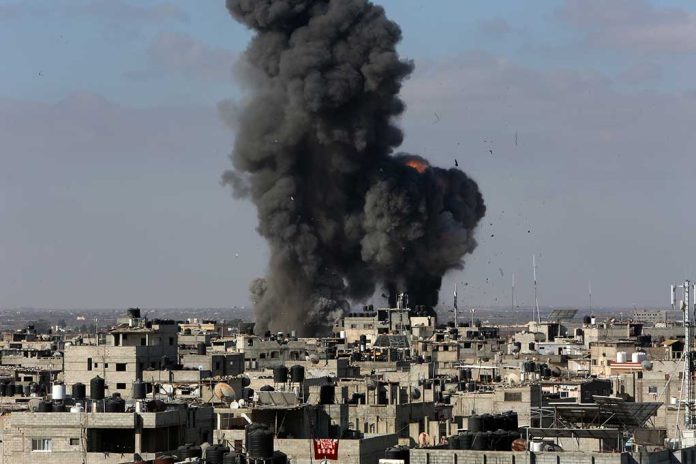
The recent Israeli airstrike in Beirut that killed Hezbollah leader Hassan Nasrallah has sparked significant geopolitical tensions in the Middle East.
At a Glance
- Hassan Nasrallah, Hezbollah’s leader, was killed in an Israeli airstrike in Beirut.
- Israel linked Nasrallah to numerous deadly attacks and considered his death crucial for their strategic goals.
- Hezbollah vowed to continue its fight against Israel and support Palestine.
- The conflict has displaced tens of thousands of Israelis and over 200,000 Lebanese.
Unfolding Geopolitical Climate
Hassan Nasrallah’s death marked a significant escalation in the conflict between Israel and Hezbollah. The Israeli airstrike targeted senior Hezbollah leaders meeting in the Dahiyeh district of Beirut. It resulted in the deaths of six people and injuries to 91 others, leveling six apartment buildings.
Israeli Prime Minister Benjamin Netanyahu stated that Nasrallah’s killing was essential for Israel’s objectives, yet warned of the escalating challenges ahead. “He wasn’t another terrorist. He was the terrorist,” Netanyahu emphasized regarding Nasrallah’s role in the region.
The Israeli military said it has killed another high-ranking Hezbollah official in an airstrike as the Lebanese militant group was reeling from a string of devastating blows and the killing of its overall leader, Hassan Nasrallah.https://t.co/BFzK36IucF
— PBS News (@NewsHour) September 29, 2024
Reactions and Consequences
Hezbollah confirmed Nasrallah’s death and pledged to “continue its jihad in confronting the enemy [Israel], in support of Gaza and Palestine.” The airstrike subsequently led to Hezbollah launching rockets into northern Israel, signaling retaliation and further conflict.
Hezbollah holds significant political power in Lebanon, occupying 13 seats in Parliament and Cabinet positions since 2005. Nasrallah’s leadership shaped Hezbollah’s strategies and growth since the 1980s.
Regional and Global Responses
Iran, a staunch ally of Hezbollah, announced five days of public mourning and condemned the assassination. Iran’s U.N. Ambassador also called for an emergency U.N. Security Council meeting. Meanwhile, the U.S. State Department urged American citizens to leave Lebanon due to the increasing instability.
“It will definitely increase the fighting and may bring Iran into it directly,” said Michael Mulroy, a former Middle East policy official at the U.S. Defense Department.
The consequences of the airstrike have been severe, with over 1,000 people killed in Israeli strikes in Lebanon within two weeks. The extensive conflict has displaced hundreds of thousands of people, exacerbating the humanitarian crisis.













